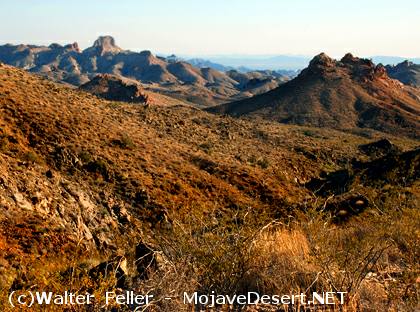Sitgreaves Expedition
1850
The United States Takes Over. The United States acquired the Southwest from Mexico by treaty in 1848, but this transfer of ownership was not
meaningful at the time to the Mojave, who had not considered their territory to be owned by Mexico. From their point of view, it had belonged
to them and continued to be their property. The citizens of the U.S., however, urgently demanded that their new territory be explored and
mapped. It was not until 1850 that arrangements could be made to send the first expedition westward across the lower Colorado River north
of the Quechan area, an expedition headed by
Captain Lorenzo Sitgreaves
of the U.S. Army Corps of Engineers.
Passing through what became Union Pass to the
Colorado River
after a difficult trip through a desert parched as a result of a drought, the Sitgreaves party reached the Colorado River someplace west
of present-day Kingman, Arizona. Following a well-worn trail down the river the party found Indian signs experienced men of the party
interpreted as warnings against proceeding further, but when they finally encountered Mojaves, they found them inclined to be friendly,
eager to run alongside them, talking and laughing. In the evening, they brought "small quantities of pumpkins, beans, corn, and sometimes
wheat to barter, and indicated they would like to set up a market to trade more extensively. Unfortunately for the continuance of such
good relations, Sitgreaves' men, being somewhat frightened of the Mojave, tried to eject the Indians from the camp. Elderly women among
the Mojave vociferously protested, and in the morning the doctor in the party was shot in the leg by an arrow (which did no harm), and
several other arrows fell among the mules. They were allowed to depart in the morning without incident, except for "yells of defiance"
from a distance (Sitgreaves 1854, cited in Sherer 1994:33-36).
A week later, the Sitgreaves expedition had a friendly reception at the next Mojave settlement, where they were told by a Spanish-speaking
Mojave that they were eight days' journey from the mouth of the Gila. They were also given a description of Camp Yuma. The expedition
members gave gifts to some of the older men, but remained vigilant, a precaution that proved fortunate when a soldier lagging in the
rear was attacked and killed by a band of 50 to 60 Mojaves, who then attacked the party as a whole with arrows. Four were killed and
several wounded by firearms in the short battle that followed, and they left, taking with them the "musketoon" of the soldier they had
killed (Sitgreaves 1854, cited in Sherer 1994:36). The Sitgreaves expedition encountered no further Mojaves by the time they reached
Camp Yuma, near the mouth of the Gila River, but they were near starvation by the time they arrived, having at the end only the most
exhausted of their few remaining mules for food, and having had to abandon most of their supplies and equipment. At Camp Yuma, provisions
to last them until they reached San Diego were waiting for them (Sitgreaves 1854, cited in Sherer 1994:36-37). As Sherer notes, the Mojave
now "knew that a small band of half-starved white soldiers had refused their proffered friendship and the foodstuff they were willing to
share in a lean year, and that the starving men had later paid for the rudeness by having to eat their bony mules before they
reached Camp Yuma" (1994:41).

Union Pass